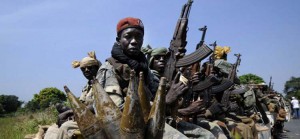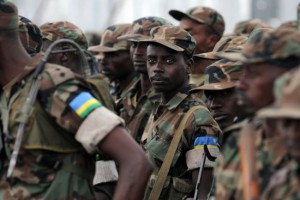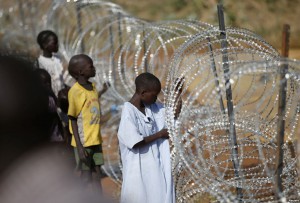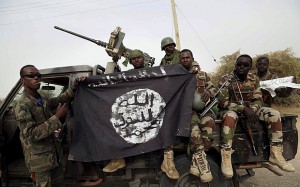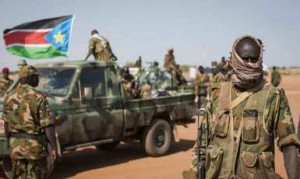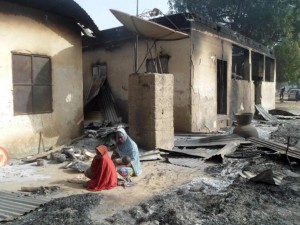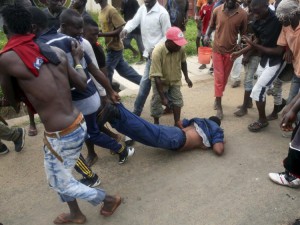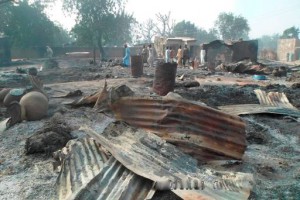Cameroon sees surge in bombings as Nigeria chases Boko Haram
Nigeria’s campaign to quash the Islamist militant group Boko Haram has triggered a surge of bombings in neighboring Cameroon, where the army says it’s making headway in stopping attacks on military targets.
Cameroon’s Far North region has been hit by as many as 19 militant attacks since the beginning of the year, mostly bombings by teenagers with explosive devices strapped to their bodies. At least 74 people were killed, in addition to almost 1,100 civilians who died in extremist violence since 2013, according to government data.
“Increased military pressure in Nigeria has forced militants across the border,” Malte Liewerscheidt, senior Africa analyst at Bath, England-based risk consultancy Verisk Maplecroft, said in e-mailed comments. “Boko Haram operates rear bases in remote border areas, which are supported by networks based on ethnic kinship in Cameroon’s Far North region. These factors enable Boko Haram to operate with a degree of impunity.”
Cross-Border Attacks
Cameroon, the world’s fifth-biggest cocoa producer, is situated on the oil-rich Gulf of Guinea and has sub-Saharan Africa’s fourth-largest proven gas reserves totaling 4.8 trillion cubic feet, according to the U.S. Energy Information Administration.
The Cameroonian government says it’s defeating the insurgents with the help of a joint military task force set up in August to combat a surge in cross-border attacks. The 8,700-member force will consist of soldiers from Cameroon, Nigeria, Chad, and Niger, countries which have all been targeted by the militants. France and China have pledged to donate weapons and vehicles.
The task force has a mandate to operate in several countries and “has been doing so with great success, as seen by the tactical changes Boko Haram has been obliged to make,” army spokesman Didier Badjeck said by phone from Yaounde, the capital. “They have been forced to adopt guerrilla tactics and suicide bombings.”
The U.S. has sent 300 soldiers to Cameroon to conduct airborne intelligence, surveillance and reconnaissance operations, according to its embassy.
Still, January recorded the deadliest blasts in Cameroon since the insurgents first surfaced with the kidnapping of a French family in 2013. At least 32 people died when four girls blew themselves up at a bustling market in the town of Bodo on Jan. 25. Bombings in villages, mosques and at a school have pushed the death toll up further.
Thinly Spread
“Cameroon’s armed forces are still spread too thinly to provide security for the remote villages usually targeted by Boko Haram, despite significant military reinforcements in the Far North over the past 18 months,” Liewerscheidt said.
The bloodshed prompted the governor of the Far North to close markets near the border and urge people to do what they can to stop the militants, including the use of magic. A steady influx of Nigerians fleeing the violence in their own country has made the already impoverished area vulnerable to food shortages, according to the United Nations refugee agency.
It wasn’t until July last year that Cameroon witnessed its first bombings carried out by two teenage girls. It isn’t clear how the group recruits children, but widespread poverty and unemployment have made the north “fertile ground” for militancy, according to John Fru Ndi, the country’s main opposition leader, who’s from the northwest.
Abject Poverty
“Some regions are swimming in luxury while others are in abject poverty,” Fru Ndi said in a speech last month.
In the 2016 budget, the government increased funding to build security posts, schools and health-care facilities in the Far North to 42 billion CFA ($94 million), from 37 billion francs the previous year.
Ethnic and regional loyalties also play a role in the radicalization of young people, according to Liewerscheidt. “Boko Haram skilfully taps into that readily accessible reservoir of new recruits,” he said.
Boko Haram has “lost the conventional military battle,” Vincent Ntuda Ebode, director of the Center for Strategic and Political Studies at the University of Yaounde II, said by phone. “The ongoing bombings are a desperate attempt to sustain fear.”
bloomberg.com
Burundi rebels say trained by Rwandan military: U.N. experts
A confidential report to the United Nations Security Council accuses Rwanda of recruiting and training Burundian refugees with the goal of ousting Burundian President Pierre Nkurunziza.
The report by experts who monitor sanctions on Democratic Republic of Congo, which was seen by Reuters on Wednesday, contained the strongest testimony yet that Rwanda is meddling in Burundi affairs and comes amid fears that worsening political violence could escalate into mass atrocities.
The report cites accounts from several rebel fighters, who told the sanctions monitors the training was done in a forest camp in Rwanda.
Nkurunziza’s re-election for a third term last year sparked the country’s crisis and raised concerns that there could be a bloody ethnic conflict in a region where memories of Rwanda’s 1994 genocide are still fresh.
The experts said in the report that they had spoken with 18 Burundian combatants in eastern Congo’s South Kivu province.
“They all told the group that they had been recruited in the Mahama Refugee Camp in eastern Rwanda in May and June 2015 and were given two months of military training by instructors, who included Rwandan military personnel,” according to the report.
The Burundian combatants, which included six children, told the U.N. experts they were trained in military tactics, use of assault rifles and machine guns, grenades, anti-personnel and anti-tank mines, mortars and rocket-propelled grenades.
They said there were at least four companies of 100 recruits each being trained in a forest camp while they were there.
“They were transported around Rwanda in the back of military trucks, often with Rwandan military escort,” the U.N. experts wrote. “They reported that their ultimate goal was to remove Burundian President Pierre Nkurunziza from power.”
Burundi and Rwanda have the same ethnic mix, about 85 percent Hutus and 15 percent Tutsis. A 12-year civil war in Burundi, which ended in 2005, pitted a Tutsi-led army against Hutu rebel groups.
Rwandan U.N. Ambassador Eugene Gasana dismissed the accusations against Kigali contained in the report and told Reuters, “This further undermines the credibility of the Group of Experts, which seems to have extended its own mandate, but apparently investigating Burundi.”
The U.N. report did not say why the Burundian fighters had crossed into Congo. But Russia’s Deputy U.N. Ambassador Petr Iliichev said last month that there had been reports of Burundian rebels trying to recruit more fighters in Congo.
“The Burundian combatants showed the group fake DRC identification cards that had been produced for them in Rwanda, so they could avoid suspicion while in the DRC,” the report said.
Burundi accused Rwanda in December of supporting a rebel group that was recruiting Burundian refugees on Rwandan soil, but Rwandan President Paul Kagame dismissed the allegations as “childish.”
The accusations by Burundi were prompted by the charity Refugees International, which said in a December report it was “deeply concerned” by claims of Burundian refugees in Rwanda that they were being recruited by “non-state armed groups”.
The U.N. Security Council traveled to Burundi in late January, its second visit to the country in less than 10 months. The United Nations has estimated the death toll at 439 people but has said it could be higher. More than 240,000 people have fled abroad and the country’s economy is in crisis.
U.S. Ambassador to the United Nations Samantha Power said during the visit to Burundi that the 15-member council had expressed concern about the allegations of external interference.
reuters.com
UN assesses Police readiness for additional peacekeepers to South Sudan
The United Nations has started a five-day inspection of Rwandan police contingent of additional 70 officers to join United Nations Mission in South Sudan (UNMISS).
A UN official, Annette R Johansen, a Norwegian Individual Police Officer (IPO) from the Formed Police Unite (FPU) coordination office in UNMISS, yesterday started the inspection ahead of the deployment.
Rwanda National Police, in November last year, deployed its maiden FPU contingent of 170 police officers in Malakal County, Upper Nile State, with Assistant Commissioner of Police (ACP) Rogers Rutikanga as the contingent commander.
Police spokesperson, ACP Celestin Twahirwa said: “The UN requested that Rwanda prepares another additional force of 70 officers, who will join the already 170 peacekeepers deployed in Malakal.”
“For the UN to request an additional force, it is an indication of the good performance and conduct of Rwandan peacekeepers,” he added.
Johansen’s mission is, therefore, to inspect the operational readiness of the force including communication skills, public order and crowd control skills among others.
Rwandan peacekeepers have been praised for professionalism and high degree of discipline, and for exporting home-grown initiatives including the monthly community work, Umuganda, supporting vulnerable communities and e-policing.
Malakal lies approximately 650 kilometers north of the capital, Juba, and has faced political violence between rival parties since South Sudan gained seceded in July 2011.
The role of FPU includes humanitarian assistance, crowd control, escorting VIPs and protection of civilians.
With the deployment of the 70 officers, Rwanda National Police will now have over 930 peacekeepers operating in seven missions and four Police Professional posts.
newtimes.co.rw
Nigeria: soldiers kill 100 Boko Haram insurgents, rescue 1200 captives in Borno
Nigerian soldiers killed 100 Boko Haram insurgents and rescued over 1200 captives in Borno border communities after a gun battle at a local market where the insurgents visit weekly, officials and witnesses said.
It was gathered that the insurgents had held more than 2000 villagers captive from various communities around the border areas of the state for more than two years.
Soldiers acting on a tip off by local security operatives stormed Boboshe village where the insurgents usually converged every Monday to trade. The insurgents who mostly go to the market armed opened fire on the soldiers.
According to local sources, the soldiers who returned fire were able to rout the militants after the intense battle.
After the victory in Boboshe, soldiers moved into Garindawaji and Mamawarhi communities where over one thousand civilians were being held captive and set them free.
Many women and young girls were among those rescued.
Falmata Kalli, 30, said Boko Haram gunmen took her away from Marte village about two years ago after they had killed her husband.
She now has a baby after she was sexually abused by Boko Haram insurgents.
“I saw them kill my husband by shooting him. After that, they dragged me away with them, my two children were left with my aged mother in-law, but I don’t know what has become of them now. It has been two years now since they attacked our town, Marte”.
Deputy Governor of the state, Usman Mamman Durkwa yesterday visited Dikwa, the border town where the rescued villagers are being camped by soldiers.
The soldiers briefed the deputy governor on the military action that set the captives free.
Durkwa subsequently ordered that luxury buses be deployed so that the rescued persons can be immediately conveyed to Maiduguri where they would be accommodated in some of the IDP camps.
leadership.ng
S. Sudan rebels accuse gov’t forces of using chemical weapons
South Sudan’s armed opposition group, (SPLM-IO) on Monday accused forces loyal to the Juba government of allegedly using chemical weapons on their forces in Lanyi and Mundri in East county of western equatoria state.
Colonel Nyarji Roman, the deputy spokesperson in the office of the SPLM-IO chairman told Sudan Tribune there was a heavy fighting between government forces and opposition forces loyal to Riek Machar in Lanyi and Mundri areas Sunday.
Nyarji said he had received a report from the ground that government forces left their base in Lanyi and entered towards the SPLM-IO site where the fighting took place.
The field commander of the SPLM-lO forces in Mundri East said his forces managed to counter government forces in self-defense, from entering the cantonment site and they pursued them up to their camp before he ordered his forces to withdraw.
“On arriving to their camp in Lanyi the government started bombing towards our forces with very unique weapon which has led our forces to go blind and started vomiting seriously”, said the SPLM-IO force commander.
“About forty of our forces went blind in a second due to the effect of what we suspected to be a chemical weapon fired on us,” he added. “But we are able to salvage them very fast by moving them to the site and give them salt”.
The two warring SPLM factions in August last year signed a final peace agreement to end the over two-year old conflict in South Sudan. However, clashes between the two rivals have since then continued in various parts of the country.
The opposition official accused president Salva Kiir government of continuing to deploy its forces in all villages in Greater Mundri contrary to the agreement.
He alleged that government forces were deployed in Tapari, Jambo, Buagyi, Lanyi, and Lui in Mundri East and Okari, Kotobi, Adango, Karika and Langowa in Mundri West County.
“The presence of those forces in the said locations were very destructive to the local population as they were, burning houses, arresting youths, rapping women and killing civilians” added Nyarji Roman.
According to him, few weeks ago, in Lanyi – Mundri East, three women were kidnapped by the (SPLA- Juba) Soldiers; the women kidnapped were still under the custody as SPLA (Juba) Soldiers in their camp in Lanyi till now.
“The conditions in which many of our people are now living in Mundri are a negative of human dignity and a disgrace to the twentieth century World”, said a mother of two, who preferred anonymity.
She added “But we believed in the facts that our real security and freedom does not depend on the pressures and negativities of the government forces in our area, but it depends on the unity of the people of South Sudan and on our united discretion’’.
The Mundri resident described the situation in the area as very frightening and requires the special attention from the regional bloc (IGAD) and the international communities.
The two South Sudan warring factions were supposed to form a transitional government by January 22, a deadline set by the Joint Monitoring and Evaluation Commission (JMEC) however failed to meet the dead line.
During the 26th ordinary session of the African Union (AU) heads of states and governments concluded on Sunday, UN Secretary-General Ban ki Moon commended efforts by the African Union (AU) to bring peace and stability to South Sudan.
However Ban said it was regrettable for the partners to miss the deadline to form the transitional government of national Unity.
Ban urged the two warring factions to let the people of South Sudan enjoy the fruits of independence.
sudantribune.com
Boko Haram exposes Nigerian president’s empty promises to defeat Islamist terror group
The Nigerian leader clearly overstated his ability to stop the Islamists, reports Alistair Dawber
The attack in the village of Dalori began when three female suicide bombers detonated their explosive belts in the name of Boko Haram.
Four hours later, after the jihadists had firebombed houses with local people locked inside, 86 men, women and children were dead.
“They came in through the bush, some of them riding on motorcycles and some in cars,” a resident of Dalori, in Nigeria’s violent north east, told Channels Television.
“People ran helter skelter for safety. Some crossed the river behind our village and we made distress calls to the soldiers but no help came. They started shooting and burnt the town. They even beheaded some of us and set the elderly, who could not escape, on fire,”
Boko Haram, the band of Islamists that has sworn loyalty to Isis and which wants to extend its writ across West Africa, is a group that President Muhammadu Buhari has previously said he has beaten. Its continued presence is an embarrassment for the retired army general. To make matters worse, as news of the attack filtered through, his government had been forced to go cap in hand to the World Bank and African Development Bank, asking for $3.5bn in loans as the fall in the price of oil has caused the Nigerian economy to falter. Last weekend was probably Mr Buhari’s worst since winning the election 11 months ago – and it capped an uncomfortable time in office.
He came to power on a promise of ending the endemic corruption that had become rife under his predecessor, Goodluck Jonathan, and offering his own guarantee as a military man that Boko Haram’s days were numbered.
He has largely over-promised and under-delivered.
“There is a difference between what he would like to do and what he is able to do,” said Richard Dowden, director of the Royal African Society.
“He made a promise to tackle corruption, in a country where the only way to get something done is to bribe somebody. Nigeria is almost ungovernable, but he has also been slow to make reforms.”
If Mr Buhari, “a straight talking military man” according to Mr Dowden, has had little time to cement changes in Nigerian society, he has been quick to laud apparent successes against Boko Haram.
In an interview at the end of last year, he said that the Nigerian army, criticised in some quarters for its ineffective performance against the insurgents, had “technically defeated” Boko Haram.
It is true that the military has enjoyed a number of successes, and Nigeria’s regional standing has gained currency – there is now more cooperation between Nigeria and its neighbours. But, as the attack in Dalori shows, the fight is far from at an end.
The war between jihadists and the Nigerian government has killed 20,000 people in the last six years and driven nearly 2.5 million from their homes.
Mr Buhari has promised “normalcy” for the people in the North-east areas around the town of Maiduguri, the worst affected area, but it appears that the normality is Boko Haram’s ability to act with impunity.
If the Nigerian president has been too quick to declare his successes against Boko Haram, he has had little chance to solve the other problem in his in-tray. Nigeria’s economy relies heavily on oil – about 70 per cent of national income comes from sales of crude – but the recent collapse in its price has caused the country’s deficit to grow. Just a third of Nigeria’s income is expected to come from oil revenues this year.
Gene Leon, the International Monetary Fund’s representative in Nigeria, told the Financial Times that Nigeria faced “significant external and fiscal account challenges”.
Africa’s biggest oil producer is looking to borrow up to $5bn to shore up its economy. Up to $3.5bn will be sought from the World Bank and African Development Bank, with the rest borrowed from the capital markets.
“We have held exploratory talks with the World Bank. We have not applied for emergency loans,” said the finance minister, Kemi Adeosun.
Some of this, at least, has been sheer bad luck for Mr Buhari. The price of a barrel of oil has halved since he was sworn in last May.
According to the IMF, Nigeria is expected to report growth of about three per cent for 2015. If accurate, it would be the lowest growth rate for more than a decade.
independent.co.uk
Boko Haram is ‘just as dangerous’ as Islamic State
‘Crude fundamentalist’ group keeps atrocities within its own region and the West takes little notice.
African-based terrorist group Boko Haram is just as deadly, barbaric and “dangerous” as Islamic State (ISIL), but the Western world ignores its atrocities because it doesn’t target Westerners, say experts.
On Sunday (AEDT), Boko Haram unleashed a massacre on the Nigerian village of Dalori, killing 86 civilians, including children.
A witness who hid up a tree during the assault told Associated Press he heard children screaming while they were burnt to death inside their homes.
Experts told the The New Daily that Boko Haram was similarly barbaric to IS given the “crude fundamentalism” it carried out.
“They are just as dangerous [as IS],” University of New England Africa expert and former diplomat Professor Helen Ware told The New Daily.
“Although with the exception that Boko Haram has not threatened any Western countries, only a few surrounding countries.”
The Islamist organisation – which killed more people than IS in 2014 – only operates in Africa and according to Professor Ware, is one of the reasons why Western media and governments don’t focus on Boko Haram like they do ISIL.
Boko Haram’s six-year-uprising has killed more than 20,000 people and displaced a further 2.5 million. It killed 6644 people in 2014 – IS killed 6073, according to the Global Terrorism Index.
“It is essentially because they’re in Africa. It is as simple as that almost,” Professor Ware said. “There is a strong feeling [in the international community] that Nigeria, which is a big country with big oil resources really ought to cope with this themselves.
Professor Ware also said that because America had refused to become involved in African disputes it meant the West had not been embroiled in the turmoil.
She said Britain, which colonised Nigeria, did not want to get involved again and “nor did Nigeria want it to”.
Similar motives to ISIL
Like ISIL, Boko Haram wants to force Nigeria to be ruled by a strict form of Islam known as sharia law.
Co-operation by force is the way that Boko Haram has sought to implement this type of rule since its insurgency in 2009.
“They have attacked Muslims [lately] becuase they’re based in the north of Nigeria,” Professor Ware said.
“They are attacking their own Muslims to create a Muslim state in northern Nigeria in the same way that IS want to create a caliphate.”
The 2015 Global Terrorism Index reported wrote that: “Most terrorist attacks were in the northeast of Nigeria where Boko Haram is based.”
This, along with other factors, illustrated the “increasing lethality” of Boko Haram, because it was targeting “private citizens” more than it ever had.
The north is also where virtually all of Nigeria’s Muslim population is based, with the south being mostly Christian.
Macquarie University associate professor in international relations Geoffrey Hawker told The New Daily this north-south divide was one of the reasons Boko Haram initially rose.
He explained that they traded off the idea that the north was getting a rough deal from the government, and were anti-establishment because of this.
However, he noted Boko Haram’s “deplorable” tactic of targeting civilians from its own faith when carrying out attacks, in particular those who receive western education or aid, for example.
Boko Haram has regularly attacked and killed school students who had been receiving a “Western-style education”, most notably when it kidnapped 276 female students at Chibok in 2014.
More than 600 days after the kidnapping the girls are yet to be released. Some have been forced to convert to Islam and marry Boko Harem members.
He explained this anti-government sentiment was similar to that of IS “even though people in the West don’t like to admit it”.
“They’re crude fundamentalists and nothing can justify that barbaric behaviour,” Mr Hawker said. “But, Nigeria is a seriously fractured nation … the ethnic and religious divisions in the country go back decades and centuries.
“Boko Haram came out of the local discontent … Nigeria is very unequal, the northerners had a cause for complaint, there are real differences, like saying the oil revenue from the south never gets to the north.”
thenewdaily.com.au
African nations to press Burundi to accept peacekeepers, sanctions threat looms
The African Union will send a mission to troubled Burundi to press the government to accept a peacekeeping force after the president rejected such a move, a senior AU official said after a summit on Sunday.
African leaders, who held a two-day summit, may also ask the UN Security Council to exert pressure with a possible sanctions threat if it refuses, a senior Western diplomat who followed the proceedings told Reuters.
Officials said a final communique was awaiting clearance from African capitals. The senior official and diplomat were citing its main points before it was endorsed.
The AU’s Peace and Security Council announced plans in December to deploy a 5,000-strong force, saying it could invoke an article of the AU’s charter that allowed it to intervene whether or not the government agreed.
President Pierre Nkurunziza, whose bid for a third term angered opponents and sparked months of violence, rejected it.
Western powers are pressing African states to intervene to prevent Burundi sliding back into the kind of ethnically charged conflict it witnessed in a civil war that ended in 2005.
“We want dialogue with the government of Burundi,” Smail Chergui, the AU’s Commissioner for Peace and Security, told reporters after the summit, saying a “a high-level” delegation would seek Burundi’s approval to deploy the force.
He did not give further details, but the senior Western diplomat said the AU was also expected to ask the UN Security Council to pass a Chapter 7 resolution, “which could mean sanctions if the Burundians remain defiant.”
Chapter 7 of the UN charter covers the council’s authority to enforce decisions with sanctions or military force.
The Western diplomat said he understood that African leaders had endorsed the peacekeeping force “with a mandate to disarm militias and protect civilians, in addition to a larger human rights observer mission.”
Those details could not be confirmed. When Chergui was asked if more AU monitors would go to Burundi, he told Reuters: “That question is too early.”
Yahya Jammeh, president of Gambia, which is on the 15-member AU peace and security council, had said on Saturday some African states were against sending any peacekeepers to Burundi against its will. He had raised fears the AU was wavering on the issue.
Violence in the nine-month-old crisis has already killed more than 400 people, in a country that emerged from an ethnically charged civil war in 2005.
UN assistant secretary general for human rights, Ivan Simonovic, told Reuters on Saturday that the African Union, if it did not send peacekeepers, should at least boost the number of human rights monitors it has there or send some police.
UN Secretary-General Ban Ki-moon, who has praised the plan for a peacekeeping force, has called for African action.
“We cannot wait any longer, that is why it is a matter of urgency, that I am urging African leaders to act in one voice,” he said in Addis Ababa, adding that Burundi’s government should “listen very carefully and engage in inclusive dialogue”.
the-star.co.ke
Boko Haram set fire to children in horrific four hour attack
Boko Haram extremists have fire-bombed huts, burning people including children to death, in the latest attack by the Nigerian group, according to a survivor.
Scores of charred bodies lay on the streets following Saturday night’s attack on Dalori village, three miles from Maiduguri, the birthplace of Boko Haram and the biggest city in north-east Nigeria.
The attack continued for four hours, survivor Alamin Bakura said, adding several members of his family were killed or wounded.
The violence continued as three female suicide bombers detonated their devices among people who managed to flee to neighbouring Gamori village, killing many, according to a soldier at the scene.
It was not known how many people were killed as bodies were still being collected, including from the surrounding bushes where the insurgents hunted down fleeing villagers, according to security guard Abba Shehus.
Boko Haram has taken to attacking soft targets, increasingly with suicide bombers, since the military last year drove them out of towns and villages in north-eastern Nigeria.
The six-year Islamic uprising has killed about 20,000 people and driven 2.5 million from their homes.
independent.ie
- « Previous Page
- 1
- …
- 150
- 151
- 152
- 153
- 154
- …
- 229
- Next Page »

